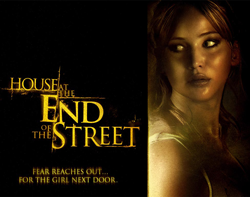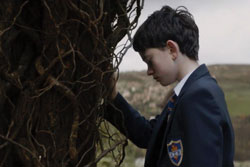You move from your hometown to a small community only to find out the previous owners of the House at the End of the Street were brutally murdered by their own daughter, Carrie Anne (Eva Link). The family’s name is whispered by the locals, while others snap that the house should be burned down. Yet one survivor, a young man named Ryan (Max Thieriot), lives within it, trying to make his way, alone, through a world that hates the ground he walks on because of what his sister has done.
Or so you think. It is soon revealed that Ryan has locked Carrie Anne away in the basement, since, contrary to popular belief, she did not perish in the woods after killing her parents. Much of the action is centered on his attempts to restrain and control her, especially when Ellisa is near.
Before I continue, let me clarify something: Contrary to what the trailers imply, this is NOT a ghost movie. At all. Though several people die, no one, at any point, comes back from beyond the grave. Many reviews on this movie have been unfairly biased by the notion that this film should’ve had ghosts.
House at the End of the Street was a well-crafted psychological thriller about Ellisa (Jennifer Lawrence), who moves from Chicago to a small, unnamed town with her mother, Sarah (Elizabeth Shue), only to befriend the wounded and scared-looking young man who lives in the house where his family perished.
Ellisa is a young woman whose father, a musician, tends to spend a significant amount of time away from home due to being on tour. Her mother is not much better, since she has a drinking problem and a history of self-destructive promiscuity, at one point being described as a “wasted slut.”
While Ellisa makes a few other friends, such as the energetic and musical girl known as Jillian (Allie MacDonald), it is clear from the beginning that her interest lies in Ryan.
By “clear from the beginning,” I mean painfully obvious. This, along with a few other elements, was a bit cliché. For instance, Ellisa is the “tough on the outside” type who plays the guitar and sings as a way of coping with her irresponsible mother and absent father. She also meets Ryan after leaving a party at which she is assaulted by the “everyone believes that he’s perfect but he’s really a sleeze-ball” character named Tyler (Nolan Funk).
Another unfortunate aspect of the movie is the setting. It is not only as uninspired as they come (A horror movie set in the woods? Really?) but there is no explanation as to the secret second basement in Ryan’s house. He certainly didn’t build it himself, and given certain details in the plot, is unlikely the parents could have built it, or afforded to hire someone else to. Though the movie was filmed in Ottowa, Ontario, no one says where the movie supposedly takes place.
While I originally had my doubts as to how good the movie would be, it surprised me in quite a few ways towards the end. I was not only surprised by the ending, but thoroughly enjoyed it. Though most of it felt like a rip-off of other successful movie ideas and generic concepts, I recommend seeing this movie at least once. Whether you see it in theaters or at home is up to you.
Foremost, the acting is fairly good throughout. Lawrence, who was great in The Hunger Games, delivered another great performance. Thieriot did phenomenally as well, perfectly capturing the evolution of his character. A number of supporting roles added to the thickening of the plot; each felt indispensable.
The cinematography was excellent. The portions shown from the perspective of Carrie Anne felt like the viewer was really seeing from a psychologically disturbed point of view. The screen moved in and out of focus while flashes, murmurs and other effects mimicked hallucinations, allowing the viewers to understand how sick she was without being directly told.
The script was also a shining feature in this film. Despite the character typing, the lines delivered were as revealing as they were brutal. One scene depicts Ryan sitting in a diner, staring into a cup of coffee without saying a word. While most movies would have him say something mournful or angst-ridden, Thieriot plays silence like Beethoven played the piano. Due to his excellence in the art of not saying anything, the waitress takes pity and brings him free cake.
That doesn’t mean it was free of flaws- one scene depicts the hero cop weakly groaning, “I protected you,” before getting killed.
At another point, Tyler and a group of friends provoke Ryan by vandalizing his car. They proceed to brawl and Ryan snaps Tyler’s ankle to the extent where, in a later scene, a doctor reports that Tyler will limp for the rest of his life. Funk, however, does not seem to know what pain is, because he groans as if he had a stomach ache.
At the end of the film, I was left with a smile on my face; not necessarily because it was an original concept, but the ending did surprise me in ways I wouldn’t have guessed. A novel execution, creative camera work, and impressive acting allowed me to look past some odd moments and the generic tendencies, earning 7.5 out of 10 stars.
IMAGE TAKEN from filmophilia.com




